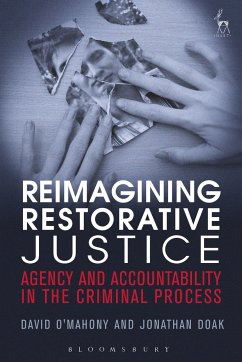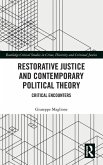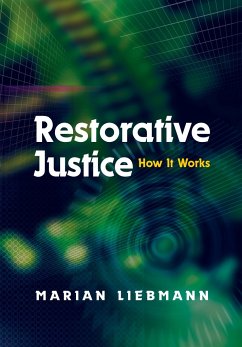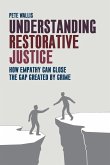Dr David O'Mahony, Dr Jonathan Doak
Reimagining Restorative Justice
Agency and Accountability in the Criminal Process
Dr David O'Mahony, Dr Jonathan Doak
Reimagining Restorative Justice
Agency and Accountability in the Criminal Process
- Broschiertes Buch
- Merkliste
- Auf die Merkliste
- Bewerten Bewerten
- Teilen
- Produkt teilen
- Produkterinnerung
- Produkterinnerung
This book offers a comprehensive analysis of how mediation and restorative practice have developed in theory and how the theory can be related to the most recent international experiences of what works and how it works.
Andere Kunden interessierten sich auch für
![Restorative Justice and Contemporary Political Theory Restorative Justice and Contemporary Political Theory]() Giuseppe Maglione (UK University of Kent)Restorative Justice and Contemporary Political Theory182,99 €
Giuseppe Maglione (UK University of Kent)Restorative Justice and Contemporary Political Theory182,99 €![Restorative Justice Restorative Justice]() Marian LiebmannRestorative Justice54,99 €
Marian LiebmannRestorative Justice54,99 €![Doing Justice to Young People Doing Justice to Young People]() Roger Smith (UK De Montfort University)Doing Justice to Young People73,99 €
Roger Smith (UK De Montfort University)Doing Justice to Young People73,99 €![Community Penalties Community Penalties]() Community Penalties60,99 €
Community Penalties60,99 €![Offenders or Citizens? Offenders or Citizens?]() Offenders or Citizens?66,99 €
Offenders or Citizens?66,99 €![New Directions in Restorative Justice New Directions in Restorative Justice]() New Directions in Restorative Justice58,99 €
New Directions in Restorative Justice58,99 €![Understanding restorative justice Understanding restorative justice]() Pete Wallis (Oxfordshire Youth Offending Service)Understanding restorative justice25,99 €
Pete Wallis (Oxfordshire Youth Offending Service)Understanding restorative justice25,99 €-
-
-
This book offers a comprehensive analysis of how mediation and restorative practice have developed in theory and how the theory can be related to the most recent international experiences of what works and how it works.
Hinweis: Dieser Artikel kann nur an eine deutsche Lieferadresse ausgeliefert werden.
Hinweis: Dieser Artikel kann nur an eine deutsche Lieferadresse ausgeliefert werden.
Produktdetails
- Produktdetails
- Verlag: Bloomsbury Publishing PLC
- Seitenzahl: 272
- Erscheinungstermin: 21. September 2017
- Englisch
- Abmessung: 233mm x 154mm x 20mm
- Gewicht: 426g
- ISBN-13: 9781849460569
- ISBN-10: 1849460566
- Artikelnr.: 37226030
- Herstellerkennzeichnung
- Libri GmbH
- Europaallee 1
- 36244 Bad Hersfeld
- gpsr@libri.de
- Verlag: Bloomsbury Publishing PLC
- Seitenzahl: 272
- Erscheinungstermin: 21. September 2017
- Englisch
- Abmessung: 233mm x 154mm x 20mm
- Gewicht: 426g
- ISBN-13: 9781849460569
- ISBN-10: 1849460566
- Artikelnr.: 37226030
- Herstellerkennzeichnung
- Libri GmbH
- Europaallee 1
- 36244 Bad Hersfeld
- gpsr@libri.de
David O'Mahony is Professor of Law at Essex Law School. Jonathan Doak is Professor of Criminal Justice at Nottingham Law School, Nottingham Trent University.
1. An Alternative Paradigm of Justice I. Introduction II. Trailblazing and
Standard-Setting III. Bridging Theory and Practice IV. Structure and
Argument of this Book 2. Restorative Justice Theory: Concepts, Processes
and Outcomes I. Introduction II. Criminal Justice: A Paradigm in Crisis?
III. Refining Restorative Justice Theory IV. Mainstreaming Restorative
Justice within Criminal Justice: The Challenge Ahead V. Conclusions 3.
Theorising Restorative Justice in Criminal Justice I. Introduction II.
Empowerment Theory III. Conclusions 4. Victims and Offenders: Agency and
Accountability in Practice I. Victims and Restorative Justice II. Offenders
and Restorative Justice III. Conclusions 5. Restorative Practices at the
Periphery of Criminal Justice I. Introduction II. Community-based
Programmes III. Restorative Policing IV. Youth Offender Panels V. Schemes
for Adult Offenders VI. Prison-based Restorative Programmes VII.
Conclusions 6. Mediation and Restorative Justice in Continental Europe I.
Introduction II. Background and Context III. Administration and Referral
IV. Process and Agreement V. Evaluation VI. Developing Restorative Justice
in Continental Europe VII. Conclusions 7. Mainstreamed Restorative Justice:
Youth Conferencing I. Introduction II. The Process of Youth Conferencing
III. Participation in Youth Conferencing IV. Satisfaction and Procedural
Justice V. Agreement: Restoration and Apology VI. Conclusions 8.
Restorative Justice and Recidivism I. Introduction II. Conclusions 9.
Reimagining Restorative Justice: Towards Empowerment I. Introduction II.
Agency and Accountability as Keys to Empowerment III. From Theory to
Practice IV. Extending the Reach of Restorative Justice V. Challenges Ahead
VI. Effecting Change
Standard-Setting III. Bridging Theory and Practice IV. Structure and
Argument of this Book 2. Restorative Justice Theory: Concepts, Processes
and Outcomes I. Introduction II. Criminal Justice: A Paradigm in Crisis?
III. Refining Restorative Justice Theory IV. Mainstreaming Restorative
Justice within Criminal Justice: The Challenge Ahead V. Conclusions 3.
Theorising Restorative Justice in Criminal Justice I. Introduction II.
Empowerment Theory III. Conclusions 4. Victims and Offenders: Agency and
Accountability in Practice I. Victims and Restorative Justice II. Offenders
and Restorative Justice III. Conclusions 5. Restorative Practices at the
Periphery of Criminal Justice I. Introduction II. Community-based
Programmes III. Restorative Policing IV. Youth Offender Panels V. Schemes
for Adult Offenders VI. Prison-based Restorative Programmes VII.
Conclusions 6. Mediation and Restorative Justice in Continental Europe I.
Introduction II. Background and Context III. Administration and Referral
IV. Process and Agreement V. Evaluation VI. Developing Restorative Justice
in Continental Europe VII. Conclusions 7. Mainstreamed Restorative Justice:
Youth Conferencing I. Introduction II. The Process of Youth Conferencing
III. Participation in Youth Conferencing IV. Satisfaction and Procedural
Justice V. Agreement: Restoration and Apology VI. Conclusions 8.
Restorative Justice and Recidivism I. Introduction II. Conclusions 9.
Reimagining Restorative Justice: Towards Empowerment I. Introduction II.
Agency and Accountability as Keys to Empowerment III. From Theory to
Practice IV. Extending the Reach of Restorative Justice V. Challenges Ahead
VI. Effecting Change
1. An Alternative Paradigm of Justice I. Introduction II. Trailblazing and
Standard-Setting III. Bridging Theory and Practice IV. Structure and
Argument of this Book 2. Restorative Justice Theory: Concepts, Processes
and Outcomes I. Introduction II. Criminal Justice: A Paradigm in Crisis?
III. Refining Restorative Justice Theory IV. Mainstreaming Restorative
Justice within Criminal Justice: The Challenge Ahead V. Conclusions 3.
Theorising Restorative Justice in Criminal Justice I. Introduction II.
Empowerment Theory III. Conclusions 4. Victims and Offenders: Agency and
Accountability in Practice I. Victims and Restorative Justice II. Offenders
and Restorative Justice III. Conclusions 5. Restorative Practices at the
Periphery of Criminal Justice I. Introduction II. Community-based
Programmes III. Restorative Policing IV. Youth Offender Panels V. Schemes
for Adult Offenders VI. Prison-based Restorative Programmes VII.
Conclusions 6. Mediation and Restorative Justice in Continental Europe I.
Introduction II. Background and Context III. Administration and Referral
IV. Process and Agreement V. Evaluation VI. Developing Restorative Justice
in Continental Europe VII. Conclusions 7. Mainstreamed Restorative Justice:
Youth Conferencing I. Introduction II. The Process of Youth Conferencing
III. Participation in Youth Conferencing IV. Satisfaction and Procedural
Justice V. Agreement: Restoration and Apology VI. Conclusions 8.
Restorative Justice and Recidivism I. Introduction II. Conclusions 9.
Reimagining Restorative Justice: Towards Empowerment I. Introduction II.
Agency and Accountability as Keys to Empowerment III. From Theory to
Practice IV. Extending the Reach of Restorative Justice V. Challenges Ahead
VI. Effecting Change
Standard-Setting III. Bridging Theory and Practice IV. Structure and
Argument of this Book 2. Restorative Justice Theory: Concepts, Processes
and Outcomes I. Introduction II. Criminal Justice: A Paradigm in Crisis?
III. Refining Restorative Justice Theory IV. Mainstreaming Restorative
Justice within Criminal Justice: The Challenge Ahead V. Conclusions 3.
Theorising Restorative Justice in Criminal Justice I. Introduction II.
Empowerment Theory III. Conclusions 4. Victims and Offenders: Agency and
Accountability in Practice I. Victims and Restorative Justice II. Offenders
and Restorative Justice III. Conclusions 5. Restorative Practices at the
Periphery of Criminal Justice I. Introduction II. Community-based
Programmes III. Restorative Policing IV. Youth Offender Panels V. Schemes
for Adult Offenders VI. Prison-based Restorative Programmes VII.
Conclusions 6. Mediation and Restorative Justice in Continental Europe I.
Introduction II. Background and Context III. Administration and Referral
IV. Process and Agreement V. Evaluation VI. Developing Restorative Justice
in Continental Europe VII. Conclusions 7. Mainstreamed Restorative Justice:
Youth Conferencing I. Introduction II. The Process of Youth Conferencing
III. Participation in Youth Conferencing IV. Satisfaction and Procedural
Justice V. Agreement: Restoration and Apology VI. Conclusions 8.
Restorative Justice and Recidivism I. Introduction II. Conclusions 9.
Reimagining Restorative Justice: Towards Empowerment I. Introduction II.
Agency and Accountability as Keys to Empowerment III. From Theory to
Practice IV. Extending the Reach of Restorative Justice V. Challenges Ahead
VI. Effecting Change








